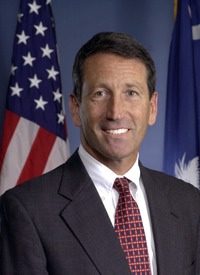
The saga of South Carolina’s embattled Governor Mark Sanford testifies to one singular truth: when you’ve taken a stand against policies and agendas wanted by powerful people, you had better keep your nose clean, because if you do not, it will come back and bite you in the worst way.
Back in 2007, Governor Sanford signed into law a bill whereby the State of South Carolina declined to participate in the Real ID Act of 2005. Later, under pressure to ask for an extension from Homeland Security, he penned a five-page letter to then-Secretary Michael Chertoff of the Department of Homeland Security outlining the objections to the Real ID Act — financial, technical, and constitutional.
Then, more recently, Governor Sanford took an even more controversial stand, taking a stance against the acceptance by South Carolina of $700 million in federal stimulus money. Sanford, unlike his critics, realized that theold adage that every federal dollar comes with strings attached is true. He also appeared to realize that the stimulus money is money that does not really exist, as such. It is the product of the Federal Reserve’s money-creation spigot, which has been going full blast creating hundreds of billions out of thin air, propping up a system of spending and indebtedness that is, in the long run, unsustainable.
Sanford supposedly principled stances could have put himself in a position to pursue national office, possibly as soon as 2010!
Instead, he blew it!
In June, he mysteriously disappeared for several days. He’d just lost a bruising fight with the South Carolina General Assembly over the stimulus money. His office released a statement saying he was hiking in the Appalachians.
That report turned out to be untrue — as Sanford was seen in Atlanta’s Hartsfield International Airport. He’d just returned from Argentina where he’d spent several days having an extramarital affair. There were immediate calls for the governor to resign — especially in light of his having severely criticized Bill Clinton back in the late 1990s following the latter’s Monica Lewinsky episode. Sanford refused to resign and began working to put his governorship and his family life back on track — or so he said. He also made statements that seemed literally self-destructive, such as speaking of the Argentine woman as a “soul mate.”
Sanford, his wife Jennifer, and their four sons then took a two-week vacation to an undisclosed location somewhere in Europe. The stated purpose of the trip was to take an opportunity to rebuild his relationship with his family. Last week, his wife and sons moved out of the Governor’s Mansion. Sanford denies that a divorce is in the works.
Sanford’s expenditures using state aircraft and business-class airfare on flights have also come under sustained scrutiny. An Associated Press review alleged that Sanford had used state money for personal as well as political trips, violating state law. He had flown business class to London, China, Argentina, and elsewhere despite state laws requiring him to purchase the least-expensive seats available unless there are overriding circumstances such as emergency travel.
South Carolina Senator David Thomas, chair of the Senate Constitutional and Administrative Subcommittee in the General Assembly, has called for the governor’s impeachment for abuse of state finances, assuming he stands by his refusal to resign. “The difference in price between the most economical and the more expensive price of the seats the governor chose is approximately $13,700,” said Thomas in a letter released Monday.
When asked if he thought the allegations were sufficient to call for impeachment, Thomas responded, “If I were in the House, the answer would be yes. I would be involved in the beginning of the impeachment process. I think there is enough data right now to take seriously a move toward impeachment. Is that sufficient for impeachment? That I don’t know.”
Thomas was among those urging Sanford to resign after he’d admitted having an extramarital affair.
Sanford has defended his use of state aircraft and business-class airfares, saying that other governors have spent more on travel than he has. “I’m not trying to defend the practice,” he said after a Cabinet meeting, “but that has been the practice and there is some level of common sense to it.” He contended that less than two percent of his use of state planes has been questioned.
He called the criticism of his travels unfair. “In political terms,” he said yesterday, “people smell blood in the water, and they keep coming and coming and coming.”
Having doubtless made enemies of powerful people, Sanford — by his own doing, without his foes lifting a finger — has ended up where they wanted him all along: essentially discredited, his political career likely over at the end of his term even if he does not resign and avoids being removed from office.



